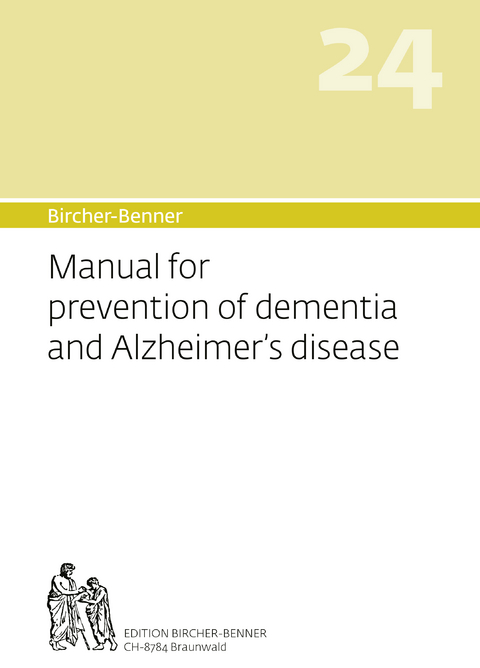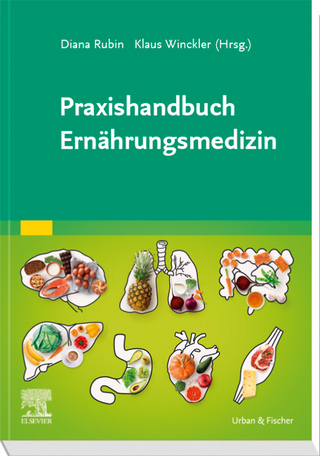
Bircher-Benner 24, Manual for prevention of dementia and Alzheimer's disease
Bircher-Benner (Verlag)
978-3-906089-19-5 (ISBN)
About the author: Dr. med. Andres Bircher is Dr.med. Maximilian Bircher-Benner’s grandson. After medical studies in Zurich and Geneva, ten years as a hospital physician in anesthesiology, intensive medicine, emergency surgery, pediatrics, psychosomatics, hematology, geriatrics, psychiatry and psychotherapy, as a specialist at Zurich university hospitals at senior level. Training analysis with Brian Kenny, head physician of a hospital for internal medicine in Zurich and later in the western part of Switzerland. Study and specialist training in TCM and acupuncture in Vienna, neural therapy, manual therapy, classical homeopathy, Training as a German specialist in balneotherapy, climatology and physical medicine. Scientific work in food energy, dietetics and the effects of regulative medicine. Medical director of the Bircher-Benner Medical Center
Table of Contents
Preface
Introduction
The structure of the central nervous system
The cerebrum
The cerebellum
The pons
The basal ganglia
The thalamic nucleus
The substantia nigra
The limbic system
The motor pathways
The sensitive tracks
The hormone-producing glands of the brain
The posterior pituitary (neurohypophysis)
The epiphysis and melatonin
The nerve cell (neuron)
The potential for action
The synapses
Inhibiting messenger substances
The importance of the glial cells in the brain
The spaces of the brain and the fluid in the brain and spinal cord
The blood-brain barrier
The myelin marrow sheaths – a sensitive substance
Demyelinating diseases
Remyelination
Diseases from storage of degenerative proteins
The TAU proteins
Amyloidosis
The effect of nutrition on the central nervous system
Two kinds of food energy
The basic regulation system of the soft connective tissue in the
central nervous system
Oxidative stress at the centre of the causes of neurodegenerative diseases
The influence of environmental stress from pollutants as the
cause of neuro generative diseases
The neurotoxic effect of mercury
Organic tin compounds and neurodegeneration
Chlorine and neurodegenerative diseases
The neurotoxic effect of volatile organic hydrocarbons
Pesticides and neurodegenerative diseases
Wood-protection agents and neurodegenerative diseases
Neurotoxic medicines and neurodegeneration
Legal and prohibited drugs and neurodegenerative diseases
Cannabis
Amphetamines
LSD (lysergic acid diethylamide)
Heroin, morphine, other opiates
Cocaine
Nicotine
Alcohol
Caffeine
Regarding the phenomenon of primary and secondary effects
and the danger of polypragmasia from medication
The combined effect of harmful neurotoxic substances
Vitamins, trace elements and neuro degenerative disease
The diversity of causes of neuro degenerative diseases
The various types of neurodegenerative diseases
Systematic overview of neuro degenerative diseases
Dementia
Diagnosis of dementia
Forms of dementia
Dementia becomes more and more frequent
Officially accepted risk factors of dementia
The symptoms of dementia
Diagnosis of dementia
Notes on care and nursing for persons suffering from dementia
Alzheimer’s disease
Causes of Alzheimer’s disease
What happens in the brain at Alzheimer’s disease
The symptoms of Alzheimer’s disease
The stages of the disease
Diagnosis of Alzheimer’s disease
Not every memory loss in old age is equivalent to Alzheimer’s disease
The early and medium stages of Alzheimer’s disease
The later stage of Alzheimer’s disease
Change of character by Alzheimer’s disease
Physical deterioration of patients with Alzheimer’s disease
Life expectancy at Alzheimer’s disease
Prophylaxis and treatment of Alzheimer’s disease
The officially recognised risk factors of Alzheimer’s disease
Order therapy for Alzheimer’s disease
Dietary treatment of neurodegenerative diseases
Lab control recommendations for the attending physician during the diet
Practical application of the raw food therapy
Menus
Daily Menu
The Recipes
Juices
Bircher muesli
Fruit and fresh grain dishes
Chilled soups
Milk types
Raw vegetables and salads
Salad dressings
Suggestions for dressings to go with the salads and raw vegetables
Cooked food
Recipes for cooked food
Vegetables
Salads of cooked vegetables
Potato dishes
Cereal dishes
Sauces
Sandwiches
Desserts
Recipes
Notes
Index
The Bircher-Benner diet has tremendous healing value.
This is why doctors, nutritionists and dieticians use our Bircher-Benner diet books.
Editorial reviews:
Prof. Dr.med. Halden, Graz, M.D.:
“I think the books are excellent. In addition to many spa plans, recipes and meal plans for a helpful and tasty diet, tried-and-tested instructions for a protective and uplifting lifestyle are also provided, which promote the understanding of the medical prescriptions.
Dr. med. Klimcyk , M.D. in the German Medical Journal:
"It saves a lot of time for the doctor and is very helpful to the patient."
Prof. Dr.med. K. Kötschau, Schlossberg, M.D. near Rosenheim:
“These books rank above all medicine, because they give you the chance to prevent almost every illness, and indeed some illnesses. That is my medical conviction, which I have come across in decades of working in preventive health care."
Dr. med. W.Matzke, M.D. in the Austrian Medical Journal:
“Everything is thought of and everything is well thought out. This is the special value of this diet book series. Every doctor should recommend it to their patients. "
Dr. med. J. V. Mengershausen, Bayrischzell, M.D.:
“Max Bircher-Benner was the leading pioneer of this natural diet and lifestyle. The series of Bircher-Benner Manuals for the most important disease groups has emerged from the wide and long-standing experience of his famous clinic, which can be highly recommended to anyone seeking healing. ”
Prof. Dr. med. Mommsen, Frankfurt / M ., M.D.:
“These books are a valuable aid for every doctor in the management of their patients. They show the sick and the person at risk of illness how they can regain health and resistance through proper nutrition. The reader will be amazed to see how varied a diet can be. It is not necessary to give up the joys of good meals. I wish the books the broadest distribution and I am convinced that our hospitals' susceptibility to illness and the resulting high occupancy rates could be significantly reduced if the nutritional advice of the Bircher-Benner diet books were followed by the majority of our population.”
Dr. med. Schoeler, M.D. in the general Homeopathic newspaper:
"It is most convenient for doctors and patients and the most reliable for success to use these inexpensive and practical diet books."
Prof. Dr..med. H. Warning, Saarbrücken, M.D.:
“Since the existence of this diet book series, many related authors have been trying to bring something equivalent and comprehensive to the diet book market that is equally practical for the dietetically informed professional and the general public. As far as I can see, this has so far been only partially successful. So the Bircher-Benner diet book series is marching at the top of its genre as before. ”
Dr. med. J. Zinke, M.D. "Classic Homeopathy":
“The diet books of the Bircher-Benner probably represent the best that is currently on the market in this genre. They save a lot of time for the attending doctor and are extremely valuable help for the patient. ”
Preface Dementia brings unspeakable suffering to people. Challenged by life, after we have achieved a lot, lived through a lot and were happily looking forward to a calm, well-deserved retirement, it mercilessly takes hold of us and robs us of our wits. We no longer understand the world around us, not our relatives and not even ourselves. Seized by fear and illusions, we lose all trust in ourselves, trust in those who once respected us, who gave us safety and a home. Our distress grows greater and greater until we can no longer even take care of ourselves or do our everyday work, surrounded by people whose names we cannot remember, whom we barely recognise, even if they are our own children. When German psychiatrist and neuropathologist Alois Alzheimer first described ‘a strange case of dementia, a strange disease of the cerebral cortex’ in 1906, he hardly received any attention at all. Today the disease is widespread and feared. There is no consensus on the cause. However, it is impossible to miss that there is a continuous increase of Alzheimer’s disease, of vascular dementia and of Parkinson’s disease in all Western countries. In all frequent forms of dementia, Alzheimer’s disease, vascular dementia, Lewy body dementia, which occurs in the scope of Parkinson’s disease, and in the rarer multiple system atrophy (MSA), genetics barely plays a role. Discounting Parkinson’s disease and multiple system atrophy, about two-thirds of those suffering from dementia suffer from Alzheimer’s and one-third from vascular dementia. Neurodegenerative diseases usually progress slowly, with degenerative inflammatory processes in various parts of the nervous system. In the last thirty years, numerous papers have identified an increasing number of partial causes of Alzheimer’s disease. Vascular dementia results from arteriosclerosis, occlusion of vessels, embolisms and bleeding in the brain. Alzheimer’s disease essentially follows the same risk factors as arteriosclerosis. They are the effects of the widespread un-natural lifestyle and nutrition, lack of movement and speed, and most of all unnatural, industrially synthesised foods with an over-abundance of animal products such as meat, eggs and fatty cheese, a lack of polyunsaturated vegetable oils and vitamins A, B, C, D, E and folic acid, and a lack of antioxidant and anti-inflammatory secondary plant substances (Phytochemicals) and fresh, raw, living plant-based food with a high oxidative stress. For Alzheimer’s disease and Lewy body dementia of those suffering from Par-kinson’s disease, the stress from environmental toxins, such as heavy metals, pesticides, irritants, drugs and medicines that they have taken in dangerous amounts, today has a high causative relevance. The focus of scientific medical thinking is on the autoimmune processes , i. e. the destructive attacks of the immune system on the structures of the body’s nervous system, the nerve cells and the sensitive myelin-containing nerve sheaths. This explains why all therapeutic efforts to combat, for example, multiple sclerosis are focused on medication designed to suppress pathogenic autoimmune inflammation. In Alzheimer’s disease, oxidative processes are at the centre, rendering certain proteins insoluble by phosphorylation so that they will deposit in the intercellular tissue and the nerve cells and destroy them. Billions are spent on unsuccessful research for medicines to prevent degenerative phosphorylation. However, very little is spent to research the actual causes of Alzheimer’s disease and on treating them. In spite of the immense financial efforts made for medical-pharmacological research, the disease continues to spread, and it is becoming more and more common. However, medical science has recently started taking the great spatial epidemiological differences in the frequency of Alzheimer’s and Parkinson’s disease seriously and to understand them. They have recognised that these diseases cannot be explained by genetics, but by differences in nutrition and lifestyle and the environmental conditions. All of these data and many scientific studies strongly suggest that the poor nutrition common in Western industrialised countries is the cause. The causes, prevention and treatment of multiple sclerosis, amyotrophic lateral sclerosis, Guillain-Barré syndrome and Parkinson’s disease are described in Bircher-Benner manual no. 1. This book is based on all the modern scientific insights that are relevant for the understanding, prevention and effective causative treatment of dementia, in addition to more than a century of medical experience. Our greatest teachers are the many patients who have been successfully treated at the famous Bircher-Benner Clinic in Zürich and at our medical centre over the years with our vital vegan fresh food diet, new life order and the careful elimination of toxin stress, foci of diseases and interference fields. This book provides the patient and his family with practical instructions for preventing dementia, or for positively influencing their courses once they have already developed. For the treating physician, this book is a great help for the instruction and guidance of his patients.
PrefaceDementia brings unspeakable suffering to people. Challenged by life, after we haveachieved a lot, lived through a lot and were happily looking forward to a calm,well-deserved retirement, it mercilessly takes hold of us and robs us of our wits.We no longer understand the world around us, not our relatives and not evenourselves. Seized by fear and illusions, we lose all trust in ourselves, trust in thosewho once respected us, who gave us safety and a home. Our distress grows greaterand greater until we can no longer even take care of ourselves or do our everydaywork, surrounded by people whose names we cannot remember, whom we barelyrecognise, even if they are our own children.When German psychiatrist and neuropathologist Alois Alzheimer first described'a strange case of dementia, a strange disease of the cerebral cortex' in 1906, he hardly received any attention atall. Today the disease is widespread and feared.There is no consensus on the cause. However, it is impossible to miss that there is a continuous increase of Alzheimer's disease, of vascular dementia and of Parkinson's disease in all Western countries.In all frequent forms of dementia, Alzheimer's disease, vascular dementia, Lewy body dementia, which occurs in thescope of Parkinson's disease, and in the rarer multiple system atrophy (MSA), genetics barely plays a role. DiscountingParkinson's disease and multiple system atrophy, about two-thirds of those suffering from dementia suffer from Alzheimer'sand one-third from vascular dementia.Neurodegenerative diseases usually progress slowly, with degenerative inflammatory processes in various parts of thenervous system. In the last thirty years, numerous papers have identified an increasing number of partial causes ofAlzheimer's disease. Vascular dementia results from arteriosclerosis, occlusion of vessels, embolisms and bleeding in thebrain. Alzheimer's disease essentially follows the same risk factors as arteriosclerosis.They are the effects of the widespread un-natural lifestyle and nutrition, lack of movement and speed, and most ofall unnatural, industrially synthesised foods with an over-abundance of animal products such as meat, eggs and fattycheese, a lack of polyunsaturated vegetable oils and vitamins A, B, C, D, E and folic acid, and a lack of antioxidant andanti-inflammatory secondary plant substances (Phytochemicals) and fresh, raw, living plant-based food with a high oxidativestress. For Alzheimer's disease and Lewy body dementia of those suffering from Par-kinson's disease, the stress fromenvironmental toxins, such as heavy metals, pesticides, irritants, drugs and medicines that they have taken in dangerousamounts, today has a high causative relevance.The focus of scientific medical thinking is on the autoimmune processes , i. e. the destructive attacks of the immune systemon the structures of the body's nervous system, the nerve cells and the sensitive myelin-containing nerve sheaths. Thisexplains why all therapeutic efforts to combat, for example, multiple sclerosis are focused on medication designed tosuppress pathogenic autoimmune inflammation.In Alzheimer's disease, oxidative processes are at the centre, rendering certain proteins insoluble by phosphorylationso that they will deposit in the intercellular tissue and the nerve cells and destroy them. Billions are spent on unsuccessfulresearch for medicines to prevent degenerative phosphorylation. However, very little is spent to research the actualcauses of Alzheimer's disease and on treating them. In spite of the immense financial efforts made for medical-pharmacological research, the disease continues to spread, and it is becoming more and more common.However, medical science has recently started taking the great spatial epidemiologicaldifferences in the frequency of Alzheimer's and Parkinson's disease seriously and to understand them. Theyhave recognised that these diseases cannot be explained by genetics,
| Erscheinungsdatum | 30.01.2019 |
|---|---|
| Verlagsort | Braunwald |
| Sprache | englisch |
| Maße | 150 x 210 mm |
| Gewicht | 250 g |
| Themenwelt | Medizin / Pharmazie ► Medizinische Fachgebiete ► Psychosomatik |
| Medizin / Pharmazie ► Naturheilkunde | |
| Schlagworte | Alcohol • Alcohol and Alzheimer´s • Aluminium Alzheimer´s • Alzheimers and pesticides • Alzheimer´s and Smoking • Alzheimer's disease • Amalgam • Amyloid • Anti Aging • Bircher • Bircher-Benner • bircher muesli • Cannabis • cell phone radiation • Coffee • detoxication • Diary products and alzheimer´s • Diary products and alzheimers • diet • Diet to avoid dementia • Drugs • Electromagnetic radiation • environmental toxins • healing diet • Heavy meal pollution Dementia • heavy metal pollution Dementia • How to avoid Alzheimers • How to prevent Alzheimers and Dementia • How to prevent dementia naturally • Manual for prevention of dementia and Alzheimer's • Manual for prevention of dementia and Alzheimer's disease • Meat causes alzheimers • Mercury • Mercury filling and alzheimers • Neurodegenerative Disease • Neurotoxin • nutricion science • Nutrition and Alzheimers • Nutrition and dementia • Order Therapy • Oxidative stress • Pesticides • Pesticides and risk of alzheimers • Pollution and Dementia • prevention • raw food • Save your brain • scientific natural medicine • Smoking • Smoking and alzheimers • tau protein • therapy • TIN • vascular dementia • vegan diet • Vegan diet and alzheimers • vegetarian alzheimers |
| ISBN-10 | 3-906089-19-3 / 3906089193 |
| ISBN-13 | 978-3-906089-19-5 / 9783906089195 |
| Zustand | Neuware |
| Informationen gemäß Produktsicherheitsverordnung (GPSR) | |
| Haben Sie eine Frage zum Produkt? |
aus dem Bereich


